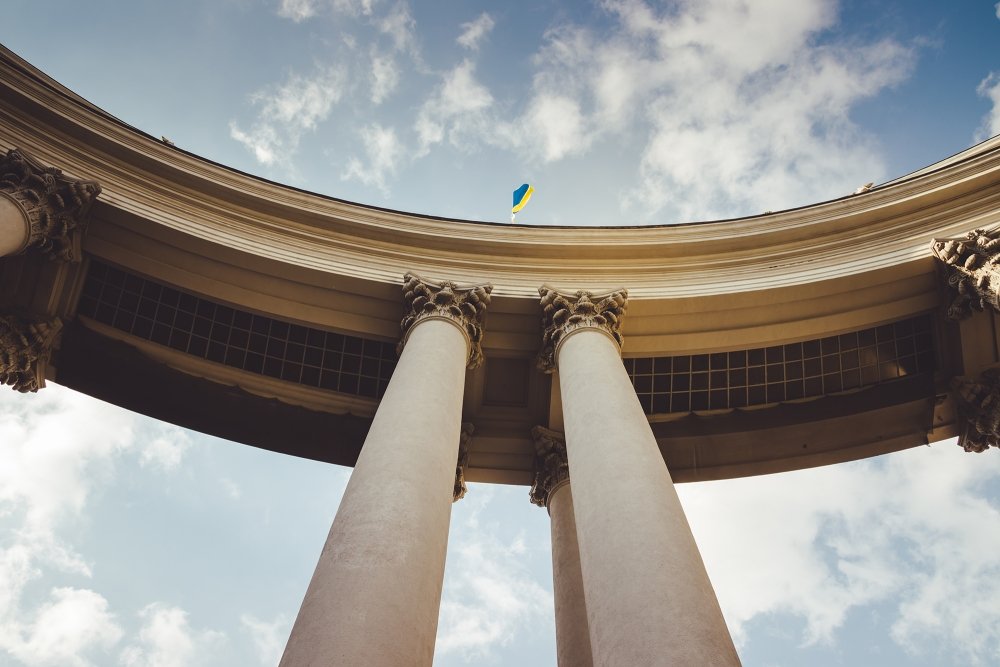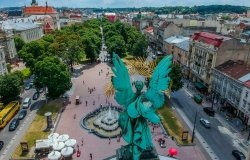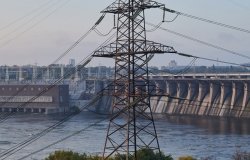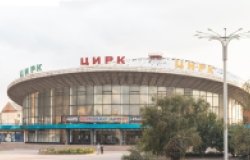
A blog of the Kennan Institute
Ukraine Quarterly Digest: April–June 2020

Shutterstock
BY ANDRIAN PROKIP
From a political perspective, the second quarter of 2020 was relatively quiet in Ukraine. Ordinary life was overshadowed by the exigencies of the COVID-19 pandemic. Measures taken to contain the pandemic gravely affected the economic situation and contributed to a serious energy crisis. The government continued seeking loans from international financial institutions to support the economy. President Zelensky’s popularity and his political strength continued to decline. And criminal investigations into the activities of former president Petro Poroshenko became much more active, though they may be without tooth.
1. INTERNATIONAL AFFAIRS
Ukraine and NATO
On June 12, Ukraine became a NATO Enhanced Opportunities partner. The new status affords a number of advantages to Ukraine but does not change or speed up any decision on NATO membership. It does allow Ukraine to send delegates to NATO’s headquarters in Brussels, take part in NATO military exercises, and deepen its cooperation with the alliance.
This progress in relations with NATO was supported by Germany. On June 2, German defense minister Annegret Kramp-Karrenbauer and Ukraine foreign affairs minister Dmytro Kuleba held an official meeting in Berlin, at which the German politician publicly supported Ukraine’s efforts to build closer ties with NATO. The parties also discussed bilateral military and technical cooperation between Ukraine and Germany.
Investigation of Downed Ukrainian Passenger Aircraft
Tehran and Kyiv have lost any kind of shared understanding with regard to investigating the downing of a Ukrainian passenger plane over Iranian airspace on January 8, 2020. Iran said the missiles had been fired at the aircraft unintentionally during a tense period with Iraq. On June 30, Iranian media reported that Tehran had sent the black boxes containing cockpit voice and data recorders from the Ukrainian aircraft to France, not Ukraine, for expert study. (Under global law, once Iran acknowledged the plane was downed by its forces, it is now responsible for conducting the investigation.) Canada, which lost fifty-seven citizens, will assist in reading the data recordings, work that is scheduled to start in July
After issuing a diplomatic note and considering suing Iran in international courts, Kyiv now may become more demanding of Iran and the ongoing investigation.
Ukraine-Hungary Negotiations
On March 26, Ukraine’s foreign minister Dmytro Kuleba and his Hungarian counterpart, Peter Siarto, conducted an online video call in a bid to break the impasse in bilateral relations with regard to controversial aspects of the Ukrainian language law. Hungary has been blocking the work of the Ukraine-NATO Commission for three years now because of the law, which imposes limits on the school levels at which Ukrainian Hungarians are able to study in their native language. During the negotiations, Kuleba and Siarto agreed to renew talks oriented toward establishing bilateral intergovernmental commissions, the first such move in seven years. They also agreed to sign a memorandum on health care cooperation to combat the COVID-19 pandemic and to organize further talks on harmonizing Ukraine’s laws with respect to the Ukrainian-domiciled Hungarian minority’s interests and the recommendations of the Venice Commission. On May 29, Foreign Minister Kuleba made his first official visit to Hungary and met his counterpart. The talks focused on boosting bilateral trade and border infrastructure development.
US Javelin Missiles Shipped to Ukraine
In late May, the Pentagon notified Congress that Ukraine’s government had made the necessary progress on key institutional reforms. This assessment enabled the release of $125 million in US military assistance to Ukraine. The amount represents half of the $250 million that Congress appropriated for Ukraine Security Assistance in the first half of 2020. The recent aid package includes counter-artillery radars and armed patrol boats, which will be of help in the waters of the Azov Sea and Black Sea that Ukraine shares with Russia.
On June 21, the US Defense Department sent a new shipment of military defense equipment to Ukraine worth $60 million. The equipment included radios, ammunition, and Javelin missile anti-tank systems. In March 2018 the United States had approved delivery of the first batch of Javelin missiles. Military aid to Ukraine was temporarily frozen in the spring of 2019 by the US administration, then resumed after the impeachment scandal broke in September 2019.
Ukraine and Belarus
On June 11, a Ukrainian government delegation headed by Andriy Yermak, chief of the presidential administration, visited Belarus. The talks covered military and technical cooperation, infrastructure projects, bilateral political contacts, and trade. In addition, Ukraine opened discussion of a potential visit to Belarus by Ukraine’s president Volodymyr Zelensky.
Crimea
In June, the Council of the European Union renewed sanctions against Russia for another year in response to the illegal annexation of Crimea and Sevastopol. Earlier the EU had published a declaration stating that the EU does not recognize and condemns the annexation of Crimea as a violation of international law. The declaration stresses the worsening situation with human rights on the Crimean Peninsula. The UNESCO Secretariat has likewise noted deterioration of the situation in temporarily occupied Crimea, chiefly with respect to lack of protection of the cultural heritage.
Sanctions against Russian Media Extended
On May 17, President Zelensky extended a ban on certain Russian social media and websites in Ukraine. The ban was first introduced by then president Petro Poroshenko on May 15, 2017, with a decree that put into force the April 28 decision of the National Security and Defense Council of Ukraine regarding sanctions against Russia. The list of entities banned on May 17 included an additional twenty-seven media companies. A few days before the ban was extended, the Verkhovna Rada passed a resolution in support of the ban.
2. INTERNAL AFFAIRS
COVID-19 Developments
Since March 11, when the government established a quarantine in Ukraine, social and economic life in Ukraine has slowed greatly. The quarantine has also worsened the economic situation in a country entering a recession. The quarantine measures led to a wave of protests, with demands that local businesses be allowed to operate in some fashion during the quarantine.
Under pressure, the government decided to soften the quarantine beginning May 22. Public transportation became available once more to all, the metro resumed operating, and hotels, kindergartens, and churches were allowed to open their doors. Later, interregional transit was resumed as well. This stage was to be followed by a one-month flexible quarantine consisting of looser restrictions, which could be tightened should the number of new infections rise.
A few weeks later, a surge in the number of new daily cases raised concern: in late June, the number of new daily cases reached 850–1,000, which was at least twice the daily number of new cases recorded just a month earlier. Health Care Minister Maksym Stepanov said that the spike in number of cases was the result of preventive measures being neglected. In mid-June, the government decided to extend the existing quarantine regime until the end of July.
Impact on the Economy and International Aid
COVID-19 has had a very negative impact on Ukraine’s economy. In June, the IMF issued a forecast anticipating an 8.2 percent decline in Ukraine’s GDP in 2020 (the March forecast indicated a decline of 7.7 percent). IMF experts do not expect a full recovery of Ukraine’s economy until 2024.
As a result of the epidemic and the preventive measures undertaken in Ukraine and worldwide, cargo transport fell by 16.5 percent during January–May (year-over-year comparison). In May 2020, industrial production decreased 11.7 percent and unemployment rose 78 percent by comparison with May 2019, and coal extraction fell by 44.5 percent. The only increase was in pharmaceuticals production.
By the end of June, the government had spent about 20 billion UAH (US $0.75 billion) to cope with the pandemic. The cabinet has also allotted an extra 3 billion UAH to support Ukrainians who lost their jobs.
The European Union, in the framework of the Eastern Partnership, agreed to provide €190 million in aid to help Ukraine cope with the economic fallout from the pandemic. The European Parliament supported providing Ukraine with macrofinancial assistance amounting to €1.2 billion to lessen the economic harm caused by pandemic.
In early June, the IMF approved a new loan for Ukraine. This time it was an eighteen-month US $5 billion in a Stand-By Arrangement, not the three-year EFF extended financing program that was discussed in the winter of 2019–2020. On June 12, Ukraine received a first tranche of $2.1 billion.
The IMF loan was greeted with skepticism by Ukrainian politicians and experts because of the huge list of demands that Ukraine had to commit to in return for the loans. Among the most prominent critics was the newly appointed head of the executive committee of the National Reform Council, Mikheil Saakashvili.
The World Bank approved $135 million for a health-improvement project in March, and a $350 million loan to support reforms and stimulate economic recovery in June.
Zelensky’s Declining Popularity
President Volodymyr Zelensky has declared that the COVID-19 pandemic created obstacles to moving forward with reforms. This announcement coincided with a drop in his popularity rating and with his plans—contrary to his campaign promises—to run for a second presidential term.
Late in June, polls showed that 63 percent of respondents thought the country was moving in the wrong direction, while only 22 percent believed it was moving in the right direction. Only 36 percent of respondents were satisfied with the actions of the president (52 percent were dissatisfied), and 53 percent of respondents feared that incompetence on the part of authorities could lead to more crises in the fall.
More about why Zelensky is losing popularity can be read in another Focus Ukraine blog piece. This Kennan Institute webcast on the first year of Zelensky’s presidency also has valuable information.
Investigations into Former President Petro Poroshenko’s Activities
When Iryna Venediktova assumed the post of Ukraine’s prosecutor general, investigations into the activities of former president Petro Poroshenko ramped up. Venediktova dealt with Poroshenko cases when she served as a chief of the State Bureau of Investigations but ran into conflict with former prosecutor general Ruslan Riaboshapka, who considered the charges against Poroshenko to be baseless.
Some of the recent accusations do seem odd, such as the charge of inciting religious hatred as the result of Poroshenko’s support for autocephaly of the Ukrainian Orthodox Church. However, all seventeen investigations are so poorly organized that none seems viable for the court.
Western politicians by and large support Petro Poroshenko. For example, Polish ex-president Aleksandr Kwasniewski and ex-president of the European Parliament Pat Cox have warned the Ukrainian authorities against politically motivated persecutions. And representatives of the European Parliament have promised to monitor carefully Poroshenko’s prosecution and have similarly cautioned against politically motivated investigations. However, most of the Ukrainian populace supports investigation of the crimes Poroshenko is alleged to have committed: for 51 percent these investigations mean some sort of justice might be had, while 30 percent see them as persecution.
Constitutional Court Ruling Lifting Judicial Responsibility for Unjust Sentences
On June 12, the Constitutional Court of Ukraine issued a decision recognizing a paragraph on judges’ responsibility for unjust sentences as unconstitutional. Discussion of the issue was undertaken at the request of a group of MPs.
The decision, however, creates a problem: in some cases there will be no way to prevent a judge from issuing an illegal decision. Moreover, lifting judges’ responsibility for their own decisions will affect legal proceeding against judges who issued illegal decisions against participants in mass protests during the Revolution of Dignity. These cases will be closed and the accused judges will escape the charges. In general, the judges of the Constitutional Court of Ukraine issued a decision in favor of all judges, some of whom may abuse their status.
Cabinet Deficiencies
The Ukrainian cabinet appointed in March has yet to figure out how to organize its work efficiently. The current prime minister, Denys Shmygal, replaced Oleksiy Honcharuk, the youngest and shortest-tenured head of the cabinet, on March 4.
Shmygal’s cabinet remains understaffed: some of the ministries do not have appointed heads. Honcharuk’s cabinet reduced the number of ministries, and Prime Minister Shmygal is trying to roll back these changes since the ministerial mergers have had either no or a negative effect on the work of government.
The Rada has been slow in approving appointments of ministers for the headless ministries. Oleksandr Tkachenko, former MP of the Servant of the People party and CEO of Kolomoisky’s TV channel, was appointed minster for culture only on June 6. Dr. Serhiy Shkarlet, a former Yanukovych supporter and Chernihiv Technical University rector widely known for his plagiarism, was appointed acting minister for education on June 25. The energy minister’s position is still vacant, despite the energy crisis roiling the country. The cabinet is also seeking a minister of agriculture after that ministry was reestablished.
Rapid rotations into and out of ministerial positions have occurred as well. The newly appointed health care and finance ministers served less than a month and left their positions in late March. Vice-Prime Minister on European Integration Vadym Pristaiko was dismissed on June 4.
Unfortunately, Shmygal’s cabinet has no support in the Rada, which contributes to its struggles to gain a footing. In the past two months parliament did not approve the cabinet’s program of economic development.
Energy Crisis
In addition to other troubles, Ukraine has succumbed to an energy crisis, perhaps the worst in the country’s three decades of independence. Beginning last autumn, Ukraine stockpiled record-high amounts of coal and gas in expectation of a gas conflict with Russia, but the conflict was avoided and the winter was exceptionally mild, so the extra supplies were not needed. Energy companies have had to decrease production because of falling demand. And Ukraine’s overregulated electricity market is still far from achieving the market-oriented practices that were expected when Ukraine introduced a new electricity market design a year ago. These and other factors contributing to the energy crisis have led to a crisis of payments between market participants. For more on the energy crisis, please see a special Kennan Focus report.
The Return of Mikheil Saakashvili
Mikheil Saakashvili is back in Ukrainian politics.
Saakashvili, formerly the president of Georgia, obtained Ukrainian citizenship in 2015. For eighteen months he served as governor of Odessa oblast. After conflict between him and President Poroshenko reached a head, the latter canceled the decree granting citizenship to Saakashvili in July 2017. In early 2018 Saakashvili was forced to go abroad. President Zelensky restored Ukrainian citizenship to Saakashvili and allowed him to return to Ukraine in 2019.
In April 2020, Saakashvili said that President Zelensky planned to appoint him deputy prime minister for reforms in the new cabinet. However, the Rada did not support this appointment since, formally, Saakashvili has been sentenced to prison in Georgia and the Georgian government considered it unacceptable to appoint a person convicted in Georgia to a high-level political post in Ukraine. Instead, President Zelensky appointed Saakashvili to chair the executive board of the National Reform Council, a consultative-advisory body. However, Tbilisi remained critical and recalled its ambassador “for consultations.” Neither country wants to see bilateral relations fracture over Saakashvili.
3. PROGRESS IN REFORMS AND SUCCESS STORIES
In June, Moody's Investors Service upgraded the Ukrainian government’s long-term issuer and senior unsecured ratings to B3 from Caa1. The main factor contributing to the upgrade was a new program with the IMF.
The Anti-Kolomoisky Law
On April 17, the Verkhovna Rada voted for the so-called “anti-Kolomoisky law.” The act, among other innovations, is intended to prevent the return of insolvent banks to their previous owners. The main political impetus for the law was to prevent the return of the nationalized PrivatBank, the biggest Ukrainian bank, to its former owners, Ihor Kolomoisky and Gennadiy Bogolyubov. Adoption of the law was among the preconditions for continued cooperation with the IMF.
The Rada’s MPs close to Kolomoisky tried to undermine adoption of the law by introducing a record 17,000 amendments to it. However, the bill was approved by the Rada, and on May 21, President Zelensky signed it into law.
4. THE SITUATION IN THE DONBAS
The situation in the Donbas saw no significant change in the second quarter of 2020. Despite previous agreements on withdrawing forces from the line of conflict, the shooting went on as usual. The Russian government continued backing armed separatists in Donetsk and Luhansk. For instance, in mid-May, Russia delivered eight tanks, eight armored combat vehicles, and three wagonloads of ammunition (including ammunition for banned caliber weapons) to the de facto authorities in the noncontrolled territories.
Prisoner Swap
In April, before the Orthodox Easter, Ukraine and the Russian-backed separatists conducted a prisoner swap. Twenty persons returned to mainland Ukraine from captivity in the occupied territories and Ukraine released fourteen civilians to the noncontrolled part of the Donbas. The prisoner exchange was praised by the leaders of Germany, France, the United States, and the UN.
The Normandy Format
On June 2, Ukraine’s government delegation, headed by Andriy Yermak, visited Berlin to discuss preparations for another summit in the Normandy format in, possibly, July or August 2020. Ten days later the same Ukrainian team visited Paris with the same purpose in mind. At the center of both sets of negotiations was the situation in the Donbas and preparation of a detailed summit agenda. Paris and Berlin engaged in the same sort of advance work with official Moscow.
Minsk Trilateral Contact Group on Ukraine
The Trilateral Contact Group on Ukraine continued working through the quarantine. In May, Andriy Yermak proposed enlarging the Trilateral Contact Group with the addition of representatives of internally displaced persons from the Donbas. Two Ukrainian journalists who are IDPs later joined the group.
We will continue to monitor economic and political developments in Ukraine and report back in the fall Quarterly Digest.
The opinions expressed in this article are those solely of the author and do not reflect the views of the Kennan Institute.
About the Author

Andrian Prokip
Director, Energy Program, Ukrainian Institute for the Future

Kennan Institute
The Kennan Institute is the premier US center for advanced research on Russia and Eurasia and the oldest and largest regional program at the Woodrow Wilson International Center for Scholars. The Kennan Institute is committed to improving American understanding of Russia, Ukraine, Central Asia, the Caucasus, and the surrounding region though research and exchange. Read more










